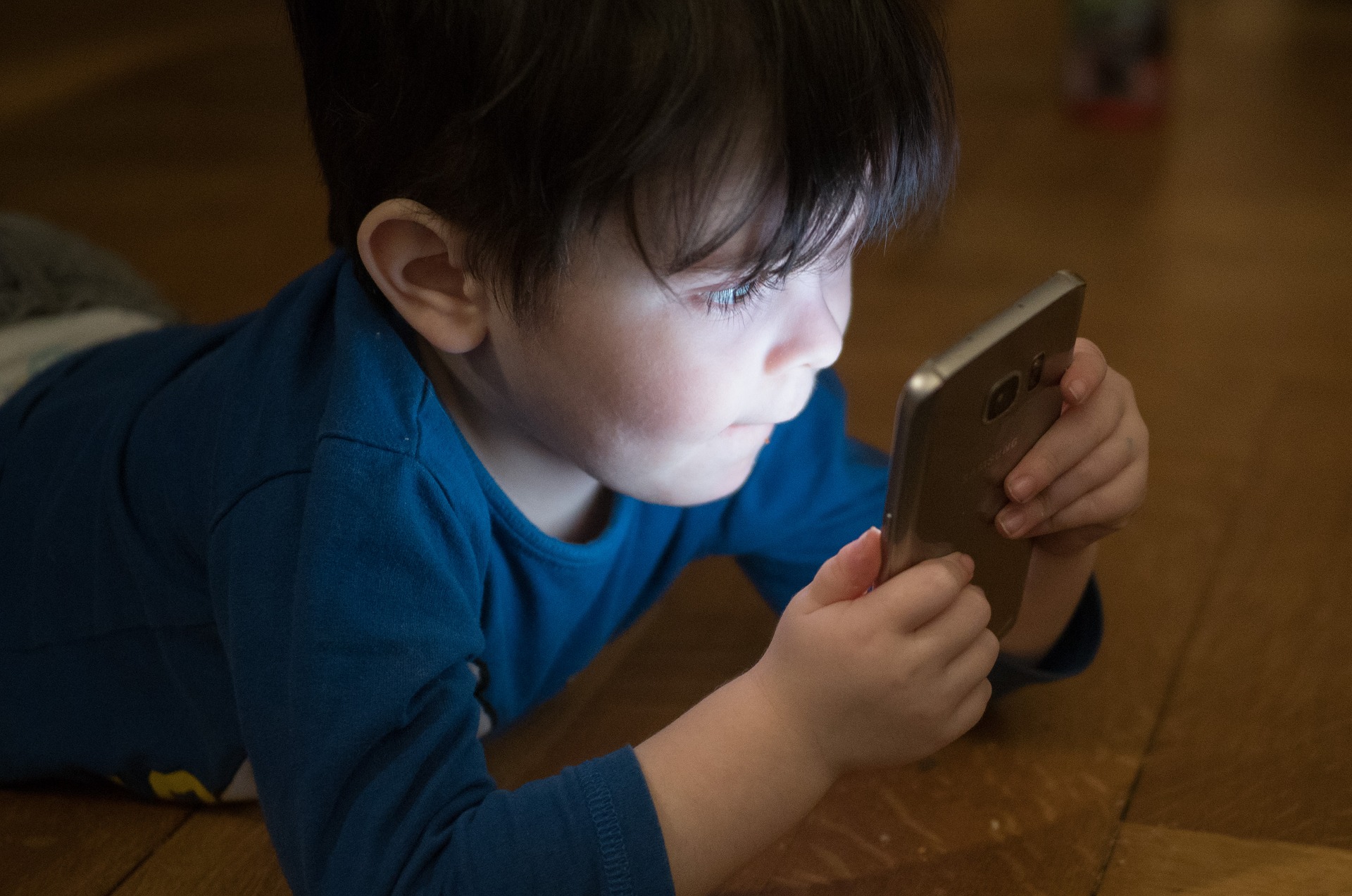
(Pixabay/Andi_Graf)
If someone would just place a mitre on my head, I'd solve the problems of the Church — easily and quickly. Then, I get a whiff of my own hubris and realize how ridiculous that thought is. No one person can solve a crisis alone; even the Son of God called out 12 people to assist him. Moreover, we are all creatures of our environment.
That's what terrifies me and changes my focus from the problems of the Church to the problems of my home. I, along with my wife and children are creatures of our home environment where I'm perpetuating a crisis which has proven neither quick nor easy to solve. The crisis? My children observing me, phone in hand, eyes on screen, attention … not on them. My four-year-old daughter recently asked, "Daddy, when I'm older can I get a cell phone?" Luckily I had my smartphone in my hand so I could immediately Google what other questions can be both innocuous and damning at the same time. That's partly false. I didn't Google anything in that moment, but yes, my phone was in my hand.
My children see me as I fix my gaze on screens large and small. The TV, a laptop, and probably what my children observe most, my eyes on my smartphone screen. From this they see me place value in these screens and wish to have their own screen time. Children observe and oftentimes want to imitate the grownups around them. I'm cognizant that I don't want my children to observe this, nor do I want them to imitate behavior that is not good for the body nor good for the soul. Succinctly, I'm failing at the ministry of presence in my own home.
It is important to articulate just how am I failing at the ministry of presence. Consequently, I have to articulate well just what exactly about using my smartphone is harmful to my body and to the soul. Otherwise, this confession could easily be misconstrued as "religious man laments modern technology." I'm not opposed to nor am I planning to dispense with my smartphone, but I need to realize that the use of screens can quite literally have lasting neurochemical consequences.
"Daddy, can I have a cell phone?" is a rarer question compared to the plethora of questions my daughter asks daily. Yet it's not a question she asks that gets to the heart of the ministry of presence, it's a frequent declaration — a cute but firm demand — "Daddy, watch this!" While I might be in the kitchen making dinner when she commands me to watch her newest dance move, more likely I'm in the same room with her not observing her with complete attention. Like the newspaper before it, I am reading up on the days' happenings (and newest memes) on my phone. But I might be in the kitchen pulling up a recipe for dinner, or I might be texting, glancing at my pedometer, checking my email, calling my parents and doing all of this without a second thought in front of my children. We are together in proximity, yet when it comes to quality attention I am quite distant.
My kids get a morning and bedtime hug. There's usually a few more hugs and a handful of high fives, maybe a pat on the head, cuddles, or we'll play airplane as I hoist them in the air. Either way we're probably talking about less than 50 substantive physical touches per day per kid. My cell phone gets more than 2,500 touches per day. I chauffeur the kids to pre-school or day care about 60-90 minutes after we wake, and I chauffeur them home where we'll get about three hours together before bedtime routines begin. At most, my children see me for six to seven hours a day. I spend over eleven hours per day looking at screens, three-and-a-half of those hours on my cell phone. Clearly the time I'm on screens overlaps with the time I'm with my children.
If I'm with my children but a screen is involved I am not engaged in quality time with them. Quality time — and physical touch — is a love language, it is the essence of the ministry of presence. Presence, or being in the moment, being attentive, being available to the people with you, without outside distractions. This ministry is foundational for teaching my children the ways of the world and our faith. It is right there in the Baptismal Rite, "[Parents] will be the first teachers of their child in the ways of faith. May they be also the best of teachers, bearing witness to the faith by what they say and do, in Christ Jesus our Lord."
I confess that constant screen gazing is not the best thing to teach. I've attempted to put the phone away more so that in the evenings my children don't think the phone is a formal appendage to the human body. I achieved this by printing recipes for dinner in advance; putting the ringer off and leaving the phone upstairs so that it's out of sight and out of mind. People have gotten a call from God long before Alexander Graham Bell, so I have enough confidence that I won't miss anything that important if I don't check my phone constantly.
Quick digression, I'm relatively thankful for Mass because of this. There, one will find people with cell phones in their pockets, and likely no other screens in the sanctuary — thanks be to God. This is a welcome break from digital technology, save for a few folks who might make their tithing through an app during the offertory. This may make the liturgy seem like 60 minutes of misery-inducing-boredom to some, but there is, it seems, a neurological explanation for that.
Having identified the issue of the ministry of presence as a parent in the screen age, I now turn to how my smartphone use is bad for my body, yes my soul, and thus my children.
Advertisement
What we see on our screens oftentimes is a visualization of rather psychologically sophisticated algorithms. Former Facebook President Sean Parker said that Facebook is operational as an addictive entity that thrives on "a vulnerability in human psychology." Adding, "It literally changes your relationship with society, with each other. It probably interferes with productivity in weird ways. God only knows what it's doing to our children's brains."
While not exclusive to the minds of our children, things such as the Facebook "like" button or Instagram heart provide a boost of dopamine, a chemical that can be achieved alone, unlike the release of serotonin. Where serotonin also releases a feeling of happiness, it is achieved most often outdoors, with physical or interpersonal/group activity, and we have less of it when we engage in lonesome screen viewing. Lower levels of serotonin may correlate with higher rates of depression. Do I want to teach my children to get satisfaction primarily through a screen? Absolutely not. I want them to see and experience the natural world, form personal friendships, develop healthy interpersonal relationship skills, and not prioritize the digital landscape. If it looks good on Instagram, it'll look just as good in person. If you put the phone away, you won't engage in texting-and-driving accidents, the deaths from which there are in the thousands; 11 teens die daily due to texting and driving. Modifying brain chemicals, possible depression, and facilitating fatal accidents show that this can be bad for my body.
The last point, and perhaps the most obvious, smartphones are a formidable obstacle to the deposit of faith — they are bad for our souls. Just look at #CatholicTwitter. No don't, I don't want to afford a near occasion of sin. What need have we of an omnipotent God, whose voice is difficult to discern at best and silent at worst when Siri's voice is clear and immediate? The phone provides avenues for entertainment that the Church does not. Last year, I was present for a lecture by Dr. Read Schuchardt, professor of communications from Wheaton College. His presentation covers all this and more, and with better and more direct terms. He even gave practical advice in parish settings about this issue, which you can view at the University of Notre Dame McGrath Institute YouTube page (irony?).
I'm someone who hangs his hat of faith on the parable of the Good Samaritan, the Beatitudes, and the Paschal Mystery, how can I expect my children to hear the Word and keep it? There is no need for the Christian example of physically gathering two or more people to love God and love neighbors if one believes that they can be of service, charity, empathy and community building exclusively through their well-lit, answers-on-demand, dopamine-gratifying, boredom-eliminating phone.
So go ahead and place a mitre on my head. The result? Same mitre different head. I've much work to do to get my own house — the domestic church — in order before I think I can set the Church in order. No one person can solve a crisis alone, but until I learn how to sacrifice quality time with my smartphone I'll continue sacrificing the precious little quality time I have with my young children. Prayers are welcome in this struggle, so too is a bout of Wi-Fi failure to spur things along.
[Mark Piper, a Packers fan in an unholy land, works in the nonprofit sector and resides in Chicago with his family. He is an alumus of Amate House, an AmeriCorps-approved year of service organization sponsored by the Chicago Archdiocese.]
Editor's note: We can send you an email alert every time a Young Voices column is posted to NCRonline.org. Go to this page and follow directions: Email alert sign-up.





